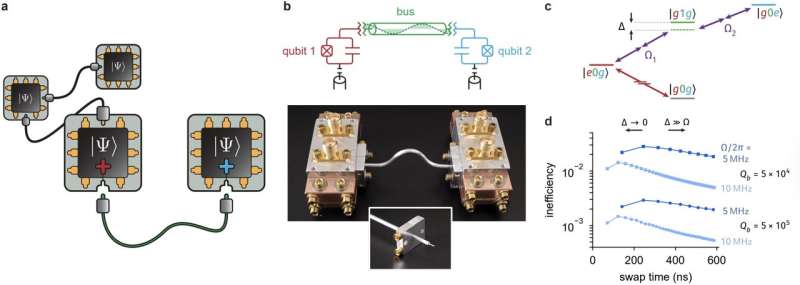Science
Researchers Unveil Modular Quantum Network for Superconducting Devices

Researchers at the University of Illinois at Urbana-Champaign have introduced a groundbreaking modular quantum architecture designed to enhance the scalability of superconducting qubit devices. This innovative approach aims to tackle the challenges associated with maintaining fault tolerance and error correction in quantum computations, a significant hurdle for the field of quantum computing.
Quantum computers leverage the principles of quantum mechanics to perform calculations that classical computers struggle with, particularly in optimization and data processing tasks. Despite advancements in quantum technology over the years, reliably scaling these systems to handle real-world applications has proven difficult. The team’s findings were detailed in a paper published in Nature Electronics on July 30, 2025.
Modular Quantum Computing Explained
The proposed system comprises multiple modules, consisting of superconducting qubit devices, which can function independently yet connect to each other through a low-loss interconnect. This configuration enables the formation of a larger quantum network while preserving the fundamental quantum effects required for extended computational tasks.
According to Wolfgang Pfaff, the senior author of the study, the impetus for this research stemmed from the growing consensus in the field that breaking processors into independent devices—termed ‘modular quantum computing’—is essential. “Even companies like IBM are pursuing this approach,” Pfaff noted in an interview with Phys.org. “We aimed to create an engineering-friendly interconnect to facilitate this model.”
Pfaff and his colleagues focused on minimizing both signal degradation and energy loss when transmitting quantum information between devices. Their strategy involves utilizing a high-quality superconducting coaxial cable known as a bus-resonator. This cable connects to a qubit through a custom connector that achieves sub-millimeter precision, enabling efficient gate operations between the qubit and the cable.
Advantages of the New Approach
The research team’s methodology demonstrates significant advantages over previous approaches to scaling quantum systems. Initial tests revealed that their setup could robustly connect and disconnect superconductor-based quantum devices without inflicting damage or introducing substantial signal loss during gate operations. “Our approach allows for the potential to build reconfigurable quantum systems from the ground up,” Pfaff explained, emphasizing the ability to ‘plug in’ additional processor modules as needed.
Looking ahead, the researchers are currently exploring ways to increase the number of connected elements within the quantum network. They aim to enhance the system’s overall efficiency and compatibility with quantum error correction techniques, crucial for the practical implementation of quantum computing.
This research represents a promising step forward in the quest for scalable quantum computing solutions, potentially paving the way for more complex and capable quantum systems in the future. As the field continues to evolve, the implications of these findings could significantly impact how quantum devices are constructed and utilized.
For further details, refer to the work of Michael Mollenhauer et al in the journal Nature Electronics (2025). This study highlights the ongoing efforts of researchers in advancing the capabilities of quantum technologies.
-

 Lifestyle3 months ago
Lifestyle3 months agoLibraries Challenge Rising E-Book Costs Amid Growing Demand
-

 Sports3 months ago
Sports3 months agoTyreek Hill Responds to Tua Tagovailoa’s Comments on Team Dynamics
-

 Sports3 months ago
Sports3 months agoLiverpool Secures Agreement to Sign Young Striker Will Wright
-

 Lifestyle3 months ago
Lifestyle3 months agoSave Your Split Tomatoes: Expert Tips for Gardeners
-

 Lifestyle3 months ago
Lifestyle3 months agoPrincess Beatrice’s Daughter Athena Joins Siblings at London Parade
-

 World3 months ago
World3 months agoWinter Storms Lash New South Wales with Snow, Flood Risks
-

 Science3 months ago
Science3 months agoTrump Administration Moves to Repeal Key Climate Regulation
-

 Science2 months ago
Science2 months agoSan Francisco Hosts Unique Contest to Identify “Performative Males”
-

 Business3 months ago
Business3 months agoSoFi Technologies Shares Slip 2% Following Insider Stock Sale
-

 Science3 months ago
Science3 months agoNew Tool Reveals Link Between Horse Coat Condition and Parasites
-

 Sports3 months ago
Sports3 months agoElon Musk Sculpture Travels From Utah to Yosemite National Park
-

 Science3 months ago
Science3 months agoNew Study Confirms Humans Transported Stonehenge Bluestones









